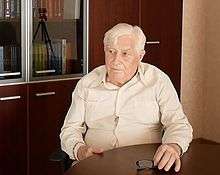Aleksandr Kapto
Aleksandr Semenovich Kapto (April 14, 1933 – April 19, 2020) was a Russian and Ukrainian sociologist, political scientist and a diplomat, journalist and politician. He earned a philosophy degree in 1967 and his Ph.D. in 1985. In 2008 he was head of the UNESCO International Board of the Institute of Socio-Political Research under the Russian Academy of Sciences (RAS).[1]
Aleksandr Semenovich Kapto | |
|---|---|
 Kapto in 2014 | |
| Born | April 14, 1933 Dnipropetrovsk Oblast, Ukrainian SSR, USSR |
| Died | April 19, 2020 (aged 87) |
| Occupation | Diplomat, author |
Education
Kapto graduated from Dnipropetrovsk University in 1957 with a philosophy degree, studying the problems of war and peace, international relations, political sociology, sociology of morality and education, social activity of youths, and professional ethics.
Career
In addition to his duties with UNESCO, Kapto served as Chairman of the Expert Council under the Top Certifying Commission for Political Science; Chairman of the Council for Defending a Doctoral Thesis under the Institute of Socio-Political Research (ISPR RAS) (sociology of spiritual life and management); Vice-President of the Academy of Social Sciences; and was a member of the Presidium of the Academy of Political Science. He was a Soviet Ambassador to Cuba from 1985-9, and the last Soviet and first Russian Ambassador to the Democratic People's Republic of Korea.
Writing career
Kapto was a member of the Union of Russian Writers. In 1971 and 1974 he received a first-degree diploma certificate for winning the All-Union Competition for the best popular science works.
Awards and prizes
- 3 Orders of the Red Banner
- Order of Friendship of Peoples
- Cuban Order of Solidarity
- S. Vavilov Medal for Outstanding Contribution to Spreading Scientific Knowledge, Enlightened and Humanitarian Activities
- Honorary Citizen of Denver, Colorado
Bibliography
- Social activity as a moral trait of an individual. Kiev, 1968.
- Public activity of youths. Moscow, 1971.
- Class education: methodology, theory, practice. M., 1985.
- Political memoirs. Moscow, 1996.
- Nobel peacemakers. Moscow, 2002.
- Encyclopedia of the world. Moscow, 2002 and 2005.
- From the bellicose culture to the culture of peace. Moscow, 2002.
References and sources
- A. Kapto’s biography (in Russian)